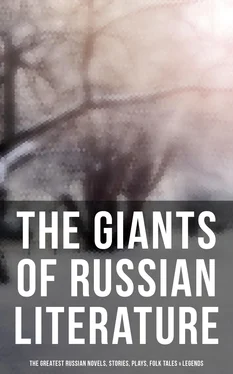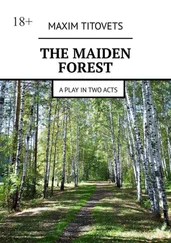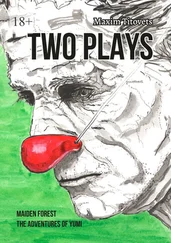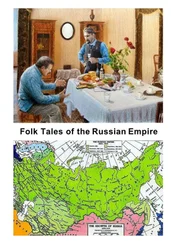Shut up in their own constricted world of forest, lake, and swamp, the Novgorodski and neighbouring Slavs would get, by means of these waterways, glimpses of other worlds, distant as the three points of a triangle, and as varied in manners, customs, and products; news of Sarkel, Itil, and the Great City, Bolgary, and strange countries yet farther east, where men dwelt in tents and rode on camels and hunted the panther, whose spotted skin was more richly marked than that of any forest lynx; visits from mariners of perhaps their own nationality, bringing tales of northern seas, of ice-floes, walruses, sturgeons, and whales; of Wends who preyed on the vessels driven on to their inhospitable shore; and, more important still, of Varangian sea-rovers who were beginning to force themselves on the Finns and Slavs of the sea-coast; above all, tidings from bands of merchants of the City of Wonders that guarded the entrance to the Farther Sea, with its gates and palaces, and temples and gardens and marts, its emperor and saints, and miracles and ceremonials, like unto nothing they had experience of themselves.
It is just at this point that the history of the Slavs of Lake Ilmen and its neighbourhood becomes largely conjectural. That they were brought in some measure under the subjection of Varangian invaders appears tolerably certain, and, favoured no doubt by the natural advantages of their position, girt round with an intricate network of forest and swamp, or, still better, protected perhaps by the poverty of their communities, they seem to have freed themselves from this foreign yoke, as the Saxons of England from time to time drove out the Danes. It was in consequence, probably, of this common danger that the Slavs were drawn into closer confederation, with the unfortunate result that domestic quarrels became rife among them, and each clan or volost was at enmity with its neighbour. “Family armed itself against family, and there was no justice.” 6This sudden ebullition of anarchy rather suggests that the Varangian intruders had swept away previous institutions or elements of order, and left nothing capable of replacing them, or else that the native Slavs were unable to grapple with the new problems of administration on an extended scale. Evidently, too, the vigorous Norsemen had obtained the reputation of being something more than mere undisciplined robbers and raiders, and their domination seemed more desirable than the turmoil and dissension attendant upon a state of self-government. And in support of this deduction, almost the first definite event recorded in the national chronicles is the resolve of the people of Novgorod to call in the leaders of a tribe known as the Russ Varangians to restore order in their land.
(Controversy has arisen among Russian historians as to the probable nationality or extraction of these “Russ” foreigners, who, like the Angles, gave their name to the country of their adoption, and some writers have assumed them to have been Slavs from Rugen or the south coasts of the Baltic, and not of Skandinavian origin. Apart, however, from the decidedly Norse form of their leaders’ names—Rurik, Sineus, Truvor, Oleg, etc.—the manner of their coming and their subsequent history harmonises exactly with that of the various Skandinavian offshoots who invaded and established themselves in Normandy, England, the Scottish islands, Ireland, and Sicily. Under their vigorous rule the Slavic settlement around Novgorod expanded in a few years into an extensive principality, imposing tribute on and drawing recruits from the neighbouring tribes, and carrying the terror of the Russian name into the Black and Kaspian Seas.)
Whether the “invitation” was genuine, emanating from the desire of the Ilmen folk to secure for themselves the settled rule of capable leaders, or whether the presence of the strangers had to be accepted as a disagreeable necessity, to mitigate the humiliation of which a legendary calling-in was subsequently invented, must remain a matter for conjecture; but with the incoming of this new element Russian history develops suddenly in scope and interest. 7
1The gathering of honey and wax from the combs of wild bees formed an important industry among the Polish and Russian Slavs.
2S. Solov’ev, Istoriya Rossie.
3S. Solov’ev.
4Ralston, Early Russian History.
5Gibbon.
6Chronicle of Nestor.
7S. Solov’ev, Istoriya Rossie. Karamzin, Histoire de Russie. Chronique de Nestor. Schiemann, Russland, Polen, und Livland. N. P. Barsov, Otcherke Rousskoy istoritcheskoy Geografie. V. Thomsen, The Relations between Ancient Russia and Scandinavia.
CHAPTER II
THE COMING OF THE VARANGIANS AND THE BUILDING OF KIEVIAN RUSSIA
Table of Contents
Whatever the nature of the causes that led up to this irruption of stranger folk, the fact and, to a certain extent, the manner of their coming is substantially set forth in the old chronicles. Like ocean demi-gods riding out from the sea into the ken of mortal men came three Russ-Varangian brothers, Rurik, Sineus, and Truvor, with a mighty host of kinsfolk and followers, steering eastward in their long, narrow-beaked boats through the waterways that lead from the Finnish Gulf into the lake-land of the Slavs. Separating their forces, Rurik established himself at—according to some accounts, built—the town of Ladoga, on the banks of the Volkhov, twelve miles from its entrance into the Lake Ladoga, thus interposing himself between Novgorod and the sea. His brothers settled at Bielozersk and Izborsk respectively, the latter occupying an important position near Lake Peipus and the Liv border, the former pushing a Varangian outpost among the Finnish tribes to the east; all three, whether from accident or design, choosing the vicinity of an open stretch of water. The date of this immigration is fixed by the chronicler at 862, which is regarded as the starting-point of the Russian State. Two years later Rurik, by the death of both his brothers, was left in sole chieftaincy of the adventurers. From his first stronghold he soon shifted his headquarters to a point farther up the Volkhov’s course, over against Novgorod, where he built himself a citadel; from thence he eventually made himself master of the town, not apparently without some opposition from the inhabitants. Henceforward the Skandinavian chief was undisputed prince of the Slavonic people who had invited him into their country; the neighbouring districts of Rostov and Polotzk were brought under his authority, and Novgorod became the capital and centre of a state which reached from Lake Peipus to the Upper Volga, and from Ladoga to the watershed of the Dvina and Dniepr. In thus extending and consolidating his power and welding his Skandinavian following and the discordant Slavic elements into one smoothly-working organisation, Rurik evinced qualities of statesmanship equal in their way to those displayed by William the Norman in his conquest and administration of England. The absence of any national cohesion among the Slavs, while facilitating the Norse intrusion and settlement, increased the difficulty of binding them in allegiance to a central authority; yet within the space of a few crowded years the Varangian ruler enjoyed an undisputed sway in the lands of his mastery such as few princes could in those unordered times rely on. Not the least difficult part of Rurik’s task must have been the control of his own wanderlusting countrymen, turned loose in an extensive and vaguely-defined region, with rumours of wealth and plunder and fighting beckoning them to the south. In the nature of things such temptation would not be long resisted, especially as the Dniepr offered a convenient if insecure passage to the desired lands, and a short time after the first Norse settlement two Skandinavian adventurers, named Askold and Dir, broke away from the main body with a small following, possibly with the idea of enlisting themselves in the Varangian Guard at Byzantium. They did not immediately pursue their journey, however, farther than Kiev, a townstead of the Polian Slavs, 8standing on a low bluff above the west bank of the Dniepr. Here they established themselves as Rurik had done at Novgorod, and, reinforced perhaps by roving bodies of their countrymen, set up a second Russian State, without losing sight, however, of the original object which had drawn them southwards. Consequently in the summer of 865 an expedition of from ten to fifteen thousand men, presumably recruited from both Slavs and Norsemen, embarked in their long, narrow war-boats and sailed for Byzantium, plundering and burning along the coast of the Black Sea, and finally riding into the harbour. The audacity of the attack, or perhaps the warlike reputation of the invading host, seems to have paralysed the inhabitants of the city, and the authorities had recourse to supernatural invocation to deliver them from this new danger. The robe of the Virgin was removed from its venerated shrine in the Blacherne Chapel, escorted in solemn procession to the shores of the harbour, and dipped in the water, whereupon arose a tempest that drove the heathen fleet in disorder out to sea. That, at least, is the account of the transaction given by the Byzantine chroniclers.
Читать дальше












